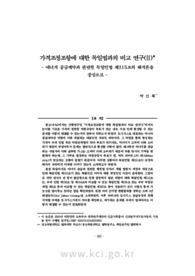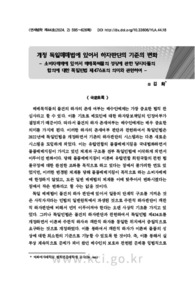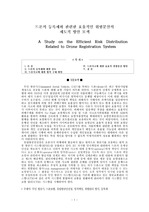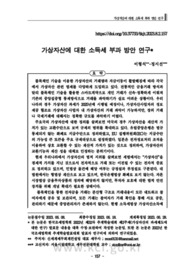

PARTNER
검증된 파트너 제휴사 자료
EU 법의 상황과 우리의 민법 (The Legal Situation in the EU and the Korean Civil Law)
한국학술지에서 제공하는 국내 최고 수준의 학술 데이터베이스를 통해 다양한 논문과 학술지 정보를 만나보세요.
30 페이지
최초등록일 2025.05.10
최종저작일
2010.12
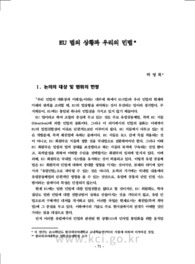
-
미리보기
서지정보
· 발행기관 : 한국민사법학회
· 수록지 정보 : 민사법학 / 52권 / 71 ~ 100페이지
· 저자명 : 박영복
초록
This article deals with the states of the European private law(Part Ⅱ). To understand the impact of the European Community on the sector of private law is taken account of the legislative bases in the European Treaty, which explain not only the present state of the Community’s achievements, but also the peculiar problems connected to the instrument of the each Member State's national legal system.
Part Ⅲ in this article describes the unification movement in the area of the private law. The piecemeal legislation of the Community cannot cope with divergencies resulting from the context of national laws and in particular with differences in structure, principles and concepts. The harmonization of the general framework which accommodates specific instruments could be carried out by legal scholarship. The important facets of the process are the contributions of legal scholarship which has turned to the analysis of general principles of private law in various fields. The Commission on European Contract Law has certainly made the greatest progress in its work.
An Action Plan of the European Commission issued in February 2003 moves the development of the European contract law into a new phase. Following up the pan-European discussion, considering the problems which result from differences among the national contract laws concerning the uniform application of EC contract law, the Action Plan goes a step further by regarding the academic examination of European contract law as an indispensable core component of further progress towards a coherent European contract law. The Commission is striving to erect the “common frame of reference(CFR)”. It aims to establish common principles and terminology in the field of European contract law.
Part Ⅳ in this article discusses the European-wide efforts of scholars to unify European private law on a comparative basis, particularly from a Korean viewpoint.
At an academic level, the Commission on European Contract Law, under the chairmanship of Professor Ole Lando, and its successor organization, the Study Group on a European Civil Code, have tried to bring to light the existence of common European legal norms and values by publishing the Principles of European Contract Law (PECL). The work done by these groups has been of considerable importance for both the modernisation and new codification of private law not only in Europe, but also in Korea. By taking into account the work already done on the codification of European private law, time-consuming preparatory comparative research is no longer necessary and there is also an substantive rules throughout the world. The PECL and the Draft Common Frame of Reference (DCFR) may also give the chance to compare certain national laws with modern trends in the fields of comparative and European law. In this respect, the incentive they provide for study and development of national as well as European contract law is to be embraced.
This Article draws the conclusion that due to the great historical influence which German civil law has played in Korea, it would be useful for finding and converting the paradigm of the Korean contract law to seek access to the current European developments in contract law directly or via German contract law (Jurisprudence).영어초록
This article deals with the states of the European private law(Part Ⅱ). To understand the impact of the European Community on the sector of private law is taken account of the legislative bases in the European Treaty, which explain not only the present state of the Community’s achievements, but also the peculiar problems connected to the instrument of the each Member State's national legal system.
Part Ⅲ in this article describes the unification movement in the area of the private law. The piecemeal legislation of the Community cannot cope with divergencies resulting from the context of national laws and in particular with differences in structure, principles and concepts. The harmonization of the general framework which accommodates specific instruments could be carried out by legal scholarship. The important facets of the process are the contributions of legal scholarship which has turned to the analysis of general principles of private law in various fields. The Commission on European Contract Law has certainly made the greatest progress in its work.
An Action Plan of the European Commission issued in February 2003 moves the development of the European contract law into a new phase. Following up the pan-European discussion, considering the problems which result from differences among the national contract laws concerning the uniform application of EC contract law, the Action Plan goes a step further by regarding the academic examination of European contract law as an indispensable core component of further progress towards a coherent European contract law. The Commission is striving to erect the “common frame of reference(CFR)”. It aims to establish common principles and terminology in the field of European contract law.
Part Ⅳ in this article discusses the European-wide efforts of scholars to unify European private law on a comparative basis, particularly from a Korean viewpoint.
At an academic level, the Commission on European Contract Law, under the chairmanship of Professor Ole Lando, and its successor organization, the Study Group on a European Civil Code, have tried to bring to light the existence of common European legal norms and values by publishing the Principles of European Contract Law (PECL). The work done by these groups has been of considerable importance for both the modernisation and new codification of private law not only in Europe, but also in Korea. By taking into account the work already done on the codification of European private law, time-consuming preparatory comparative research is no longer necessary and there is also an substantive rules throughout the world. The PECL and the Draft Common Frame of Reference (DCFR) may also give the chance to compare certain national laws with modern trends in the fields of comparative and European law. In this respect, the incentive they provide for study and development of national as well as European contract law is to be embraced.
This Article draws the conclusion that due to the great historical influence which German civil law has played in Korea, it would be useful for finding and converting the paradigm of the Korean contract law to seek access to the current European developments in contract law directly or via German contract law (Jurisprudence).참고자료
· 없음태그
-
자주묻는질문의 답변을 확인해 주세요

꼭 알아주세요
-
자료의 정보 및 내용의 진실성에 대하여 해피캠퍼스는 보증하지 않으며, 해당 정보 및 게시물 저작권과 기타 법적 책임은 자료 등록자에게 있습니다.
자료 및 게시물 내용의 불법적 이용, 무단 전재∙배포는 금지되어 있습니다.
저작권침해, 명예훼손 등 분쟁 요소 발견 시 고객센터의 저작권침해 신고센터를 이용해 주시기 바랍니다. -
해피캠퍼스는 구매자와 판매자 모두가 만족하는 서비스가 되도록 노력하고 있으며, 아래의 4가지 자료환불 조건을 꼭 확인해주시기 바랍니다.
파일오류 중복자료 저작권 없음 설명과 실제 내용 불일치 파일의 다운로드가 제대로 되지 않거나 파일형식에 맞는 프로그램으로 정상 작동하지 않는 경우 다른 자료와 70% 이상 내용이 일치하는 경우 (중복임을 확인할 수 있는 근거 필요함) 인터넷의 다른 사이트, 연구기관, 학교, 서적 등의 자료를 도용한 경우 자료의 설명과 실제 자료의 내용이 일치하지 않는 경우
“민사법학”의 다른 논문도 확인해 보세요!
-
계약각론 및 사무관리법의 개정착안점에 관한 소고 29 페이지
Im folgenden sind aus räumlichen Gründen nur die Entwürfe und ganz kurze Begründung der Reformkommission des Koreanischen Bürgerlichen Gesetzbuches bezüglich des einzelnen Vertragsverhältnisses zusamm.. -
프랑스민법전의 개정의 역사 - 한국민법전 제정 50년에 대한 시사 - 36 페이지
I. Introduction Le Code civil français a vécu et évolué sans cesse pendant deux cent ans. Le Code civil français d’aujourd’ui est bien différent de celui d'hier non seulement sur la forme mais aussi c.. -
친족법의 제·개정 경과와 과제 38 페이지
The Family l aw w as l egislated in F ebruary 22, 1958 a s law No . 471 and then c ame into effect i n January 1, 1 960. T he F amily law was revised many times to realize gender equality and child we.. -
담보법의 현재와 미래 - 민법 시행 50주년을 맞이하여 - 31 페이지
The Civil Code of Korea, like those of most East Asian countries, is modeled after the modern civil codes of the continental European countries. The Civil Code specifies mortgage, pledge, and retentio.. -
상속법의 자화상과 미래상 - 한국 민법 시행 50주년을 기념하여 - 33 페이지
There has been a remarkable development in Korean Inheritance Law during past 50 years. But we are still faced with some urgent problems in this field. First of all, it should be examined whether cust..
찾으시던 자료가 아닌가요?
지금 보는 자료와 연관되어 있어요!
문서 초안을 생성해주는 EasyAI

